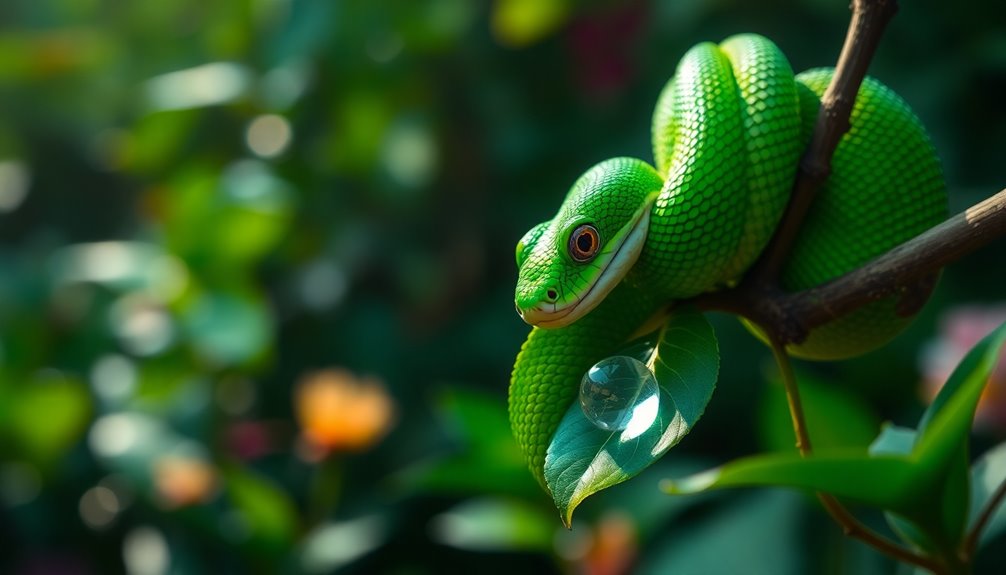While snakes might not experience love like humans do, they can show signs of affection towards their owners. Behaviors such as climbing or wrapping around you indicate trust and comfort. Though their emotional capacity is debated, simple feelings like fear and instinctual responses dominate their interactions. Understanding these behaviors can enhance your bond with your snake. Curious to learn more about their fascinating behavior and the truth behind common myths? Stick around and explore further!
Key Takeaways
- Snakes can recognize their owners and exhibit affectionate behaviors, indicating a level of trust and comfort in their presence.
- While snakes may show behaviors that mimic affection, their emotional capacity is limited compared to mammals, primarily based on instinct.
- Climbing and wrapping around their owners can signify warmth-seeking behavior and a sense of security rather than complex emotional attachment.
- Behavioral changes, like a refusal to eat, may indicate stress or discomfort, reflecting their instinctual responses rather than conscious feelings.
- The ongoing debate about reptile emotions highlights the need for further research to fully understand the emotional lives of snakes.
Understanding Snake Behavior

Understanding snake behavior can provide valuable insights into these often-misunderstood creatures. You might be surprised to learn that snakes can recognize their owners and often show affectionate behaviors.
When comfortable in their environment, they may climb on or wrap around you for warmth, signaling trust. Keep an eye out for behavioral changes; for instance, if your snake stops feeding, it could indicate stress or discomfort.
While snakes lack the brain structures for complex emotions, their basic responses suggest they experience simple feelings, like fear. Additionally, observing breeding behaviors can hint at a connection during those times.
The Science Behind Animal Emotions
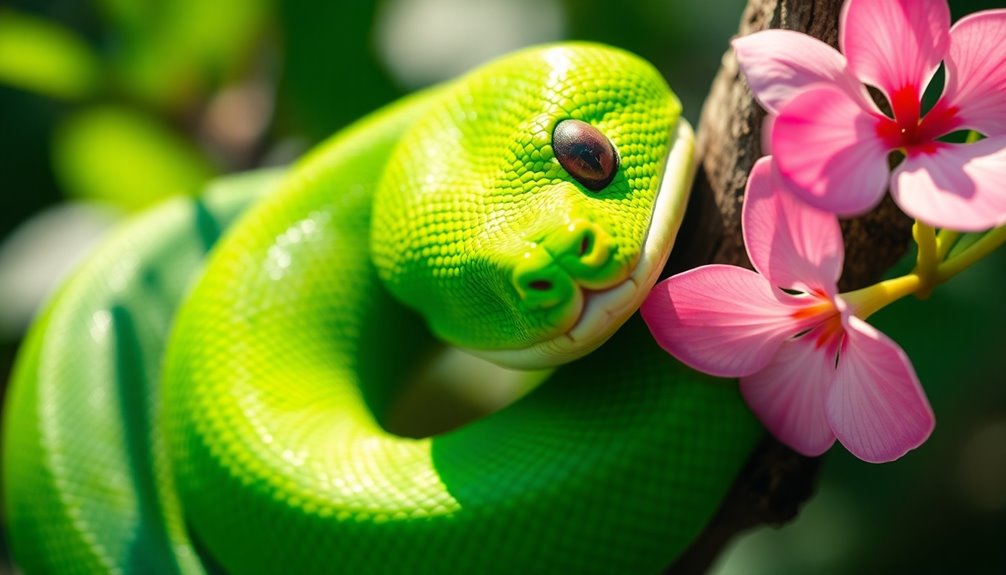
When you think about snake emotions, it's important to contemplate their simpler brain structure and how that shapes their emotional responses.
Unlike mammals, snakes primarily react through instinct rather than conscious feelings, leading to basic emotions like fear.
This raises questions about the nature of their emotional experiences and how much is driven by survival instincts.
Emotional Responses in Reptiles
Although snakes possess a simpler brain structure focused primarily on survival, they still exhibit behaviors that raise intriguing questions about their emotional responses.
While you might see a snake react with fear or discomfort, it's hard to tell if these are true emotional responses or just instinctual reactions to their environment.
Observational studies suggest that snakes show specific behaviors when threatened or in pain, hinting at a capacity for basic emotional states.
The link between pain and emotions in reptiles remains under investigation, but some evidence implies that animals capable of feeling pain might also feel love in a rudimentary way.
The ongoing debate about snake emotions often centers on interpreting behaviors as affectionate or defensive, lacking a definitive scientific consensus.
Instincts vs. Conscious Feelings
While many people might attribute certain behaviors in snakes to emotions, the reality is that their reactions are often rooted in instinct.
Years ago, researchers found that snakes rely on simpler brain structures than mammals, limiting their ability to process complex emotions. When you observe a snake, it's important to recognize that its fear or aggression often stems from survival instincts rather than feelings of love or affection.
Although some people read anecdotal evidence suggesting emotional attachment during breeding seasons, scientists still debate this. They can't explain these behaviors as conscious feelings, emphasizing the distinction between instinctual actions and true emotions.
Therefore, understanding snakes requires a cautious interpretation of their observable behaviors without projecting human-like feelings onto them.
The Role of Fear in Snake Responses
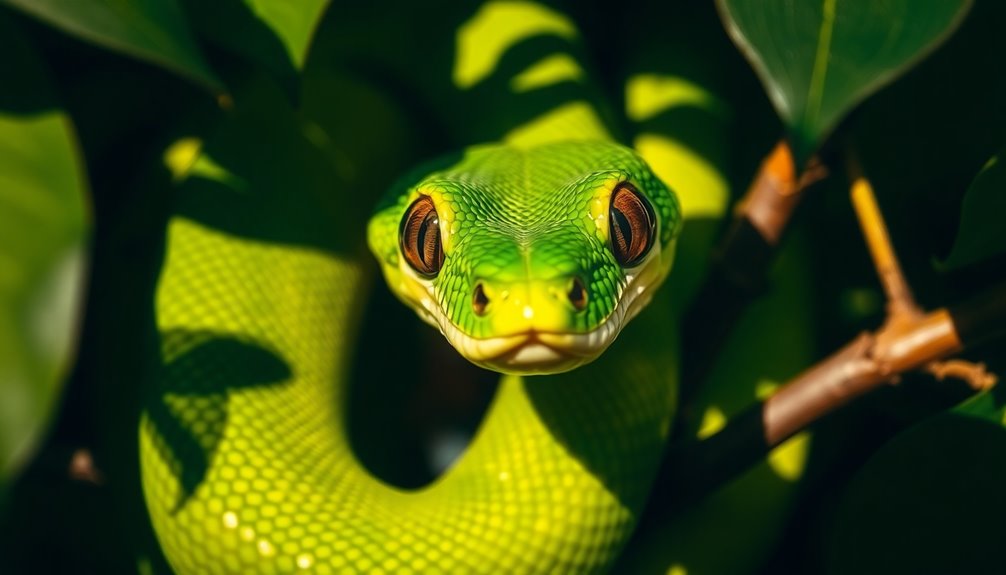
Fear plays an essential role in how snakes respond to threats, driving their instinctual behaviors such as fleeing or adopting defensive postures. When faced with danger, snakes often prefer to retreat, especially species like adders, which are naturally shy and avoid human encounters. This instinctual fear is vital for their survival.
Notably, while snakes can bite when threatened, they typically reserve their venom for hunting prey, demonstrating a calculated response to conserve energy. Misunderstandings about snakes often stem from ophidiophobia, an extreme fear that can lead to harmful attitudes toward these reptiles.
Observations of Affectionate Behaviors
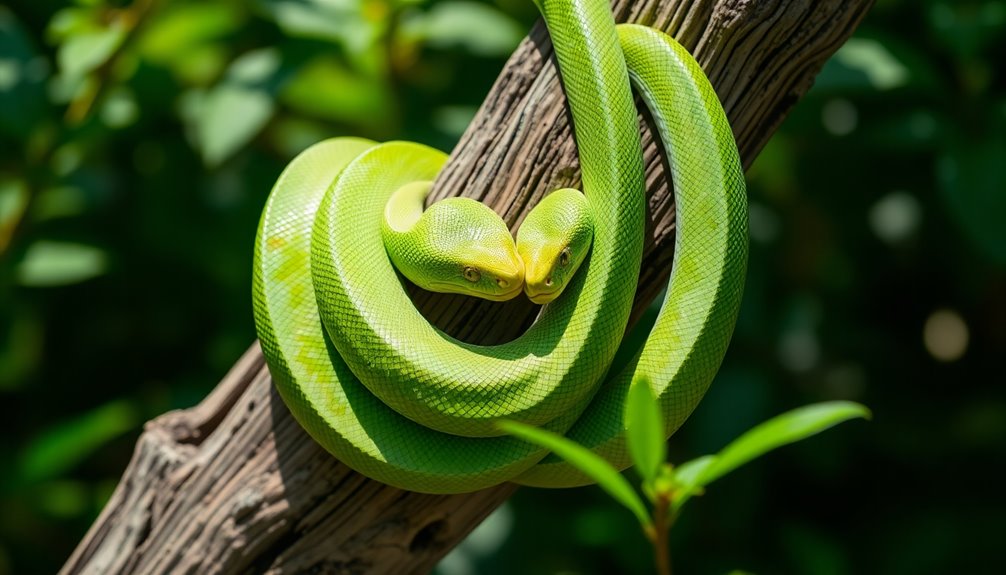
When you spend time with a snake, you might notice behaviors that suggest a bond between you and your reptilian friend. Snakes can recognize their owners and often climb on or wrap around them for warmth. Although they lack the brain structures for emotions like mammals, their calmness in your presence indicates trust.
Here's a quick overview of affectionate behaviors you might observe:
| Behavior | Description | Interpretation |
|---|---|---|
| Climbing and wrapping | Snake climbs on you for warmth | Comfort and trust |
| Calm demeanor | Relaxed body language during handling | Sense of security |
| Courtship rituals | Unique movements during breeding | Potential attachment |
| Positive interactions | Engaging with you positively | Mimics affection |
The Debate on Emotional Capacity in Reptiles
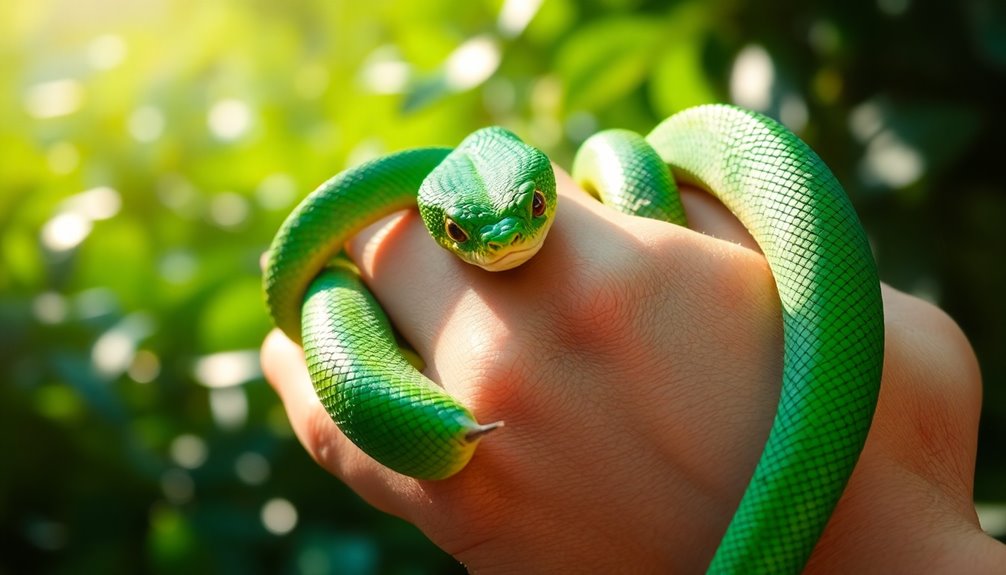
When it comes to snake emotions, definitions can really vary, making the conversation tricky.
You might wonder if their behaviors are instinctual responses or if they reflect conscious feelings. Understanding this distinction is key to grasping the ongoing debate about emotional capacity in reptiles.
Emotional Definition Variability
Although the definition of emotions varies across fields, this variability shapes the ongoing debate about whether snakes can experience feelings similar to love. Some researchers contend that reptilian emotional responses are instinctual, not conscious, which complicates understanding their emotional lives. With a simpler brain structure than mammals, reptiles may have limitations in emotional processing.
| Perspective | Insights |
|---|---|
| Emotional Instinct | Emotional responses may arise from survival needs. |
| Brain Structure | Simpler brains suggest limited emotional complexity. |
| Anecdotal Evidence | Personal stories fuel debate but lack scientific backing. |
| Need for Research | Ongoing discussions highlight a gap in definitive studies. |
This discourse showcases both curiosity and skepticism about snake emotions, emphasizing the necessity for further research.
Instinct vs. Conscious Response
The debate on whether reptiles, including snakes, experience emotions consciously or merely react instinctively is both complex and intriguing.
You might find that proponents of the instinctual view argue many behaviors, like aggression and fear, are automatic responses to environmental changes.
With a simpler brain structure than mammals, reptiles likely have a limited capacity for complex emotional processing, as their brains primarily focus on survival.
Observing snakes can reveal changes in feeding and defensive behaviors, which some interpret as emotional states.
However, these interpretations are often contentious and anecdotal.
This ongoing discussion emphasizes the importance of more research to better understand how emotions are defined across different species and what that means for reptiles like snakes.
Implications for Pet Owners and Enthusiasts
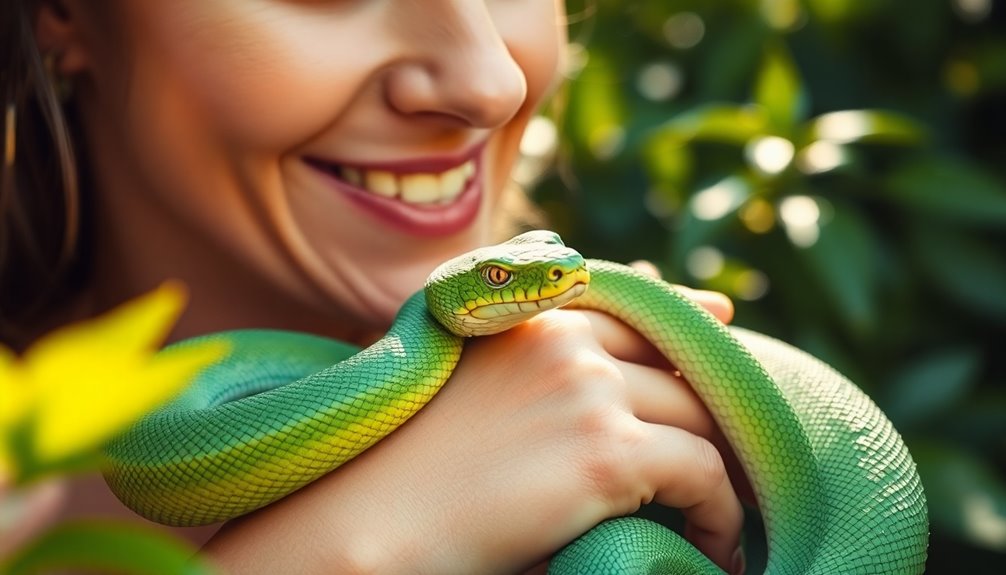
Understanding your snake's behavior is essential for fostering a positive relationship as a pet owner or enthusiast. While snakes may not experience love like humans, they can recognize you and show trust through their actions.
When your snake climbs on you or wraps around you, it's seeking warmth and comfort. By educating yourself about their behaviors, you can build a stronger bond and create a safe environment that respects their instincts.
Pay attention to cues like their willingness to interact or their reactions during handling; these signals reveal their comfort levels. Promoting awareness of snake needs can help reduce fear and misinformation, benefiting both you and your snake in the long run.
Debunking Myths About Snakes

Recognizing your snake's behavior can help you see through the myths that often cloud public perception. While many think all snakes are aggressive, most, like adders, prefer to avoid humans. Misinformation fuels fears, leading to misinterpretation of their actions.
| Myth | Reality | Impact |
|---|---|---|
| Snakes are aggressive | Most are shy and avoid human contact | Promotes fear and misunderstanding |
| Snakes can feel love | They lack brain structures for complex emotions | Misleads pet owners |
| All snake bites are deadly | Adders rarely use venom on humans | Encourages unnecessary panic |
| Snakes should be feared | Education fosters conservation | Helps reduce persecution |
Frequently Asked Questions
Is It True That Snakes Can't Feel Love?
It's true that snakes can't feel love like humans do. Their brains lack the structures associated with complex emotions, so they don't experience love consciously.
However, they can recognize you and may form a bond based on trust. You might notice your snake climbing or wrapping around you, which is more about seeking warmth than affection.
While they can show some behaviors that seem affectionate, it's rooted in instinct rather than emotional attachment.
Are Snakes Capable of Feeling Emotions?
Did you know that some snakes can recognize their owners and may even respond with comfort?
While snakes have a simple brain structure, they can show basic emotional responses like fear. You might notice behaviors that seem affectionate, but these are often instinctual rather than true emotions.
The scientific community debates this topic, suggesting that any emotional experiences snakes have differ markedly from what humans understand as emotions.
Are Snakes Actually Loyal?
When you think about snake loyalty, it's important to recognize that their behaviors stem from instinct rather than emotional bonds.
Snakes can show familiarity with you, often seeking warmth and comfort. You might notice them climbing on you or wrapping around you, which indicates trust.
However, their actions are more about survival and comfort than true loyalty. So, while they may seem attached, it's not loyalty in the traditional sense.
How Do You Tell if a Snake Likes You?
To tell if a snake likes you, observe its behavior closely.
If it nudges you gently or curls around you, it's likely seeking comfort and warmth. You might notice it following you or becoming more active during handling, indicating it enjoys your company.
While snakes don't feel complex emotions, these behaviors suggest a level of trust and familiarity.
Pay attention to these signs, and you'll get a sense of your snake's comfort around you.
Conclusion
So, can snakes really feel love? Ironically, while these cold-blooded creatures might not cuddle up like a dog or purr like a cat, their behaviors can sometimes resemble affection. Whether it's a gentle nudge or a curious flick of the tongue, you might just find yourself wondering if there's more to your scaly friend than meets the eye. So, the next time you see your snake, remember: love might be slithering right beneath the surface!
